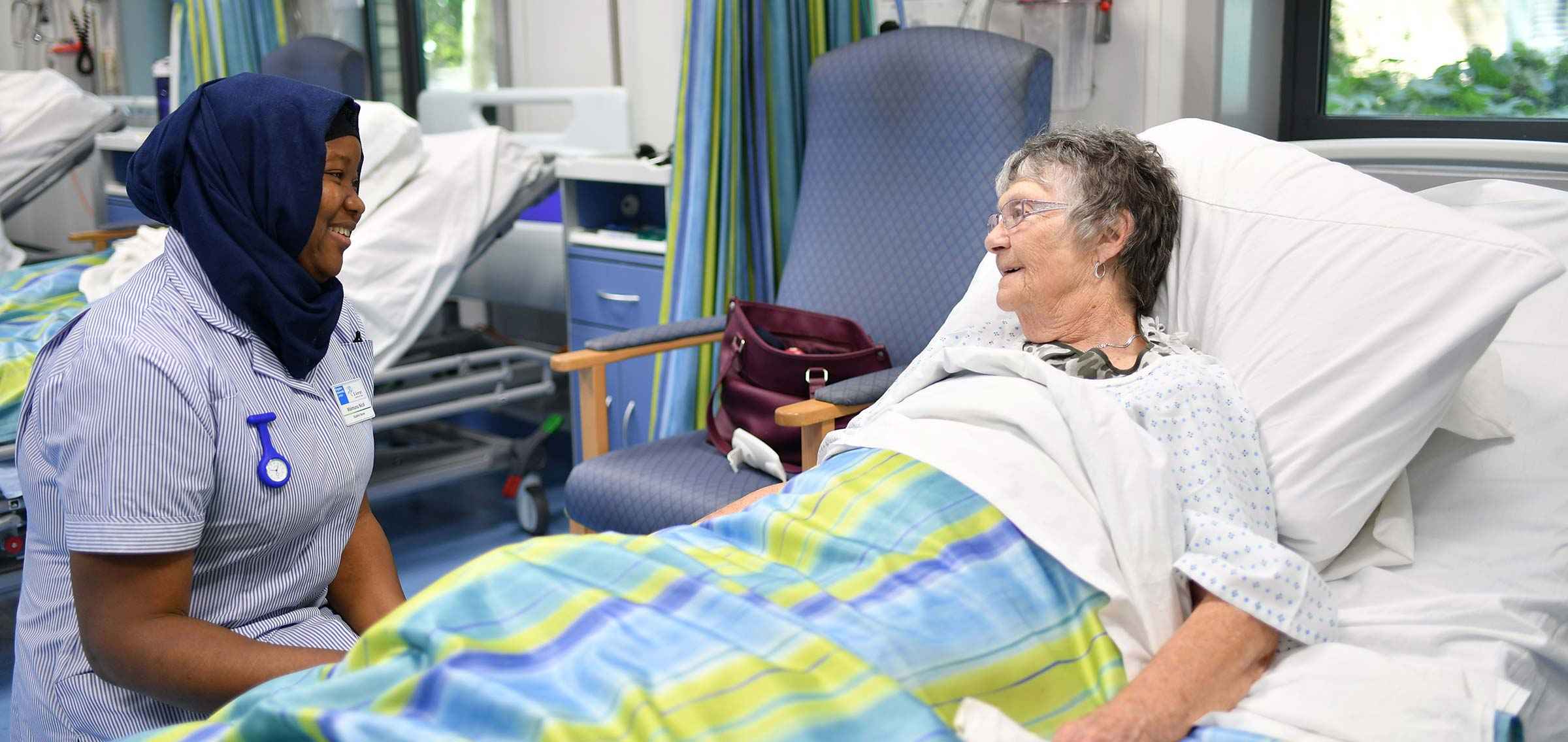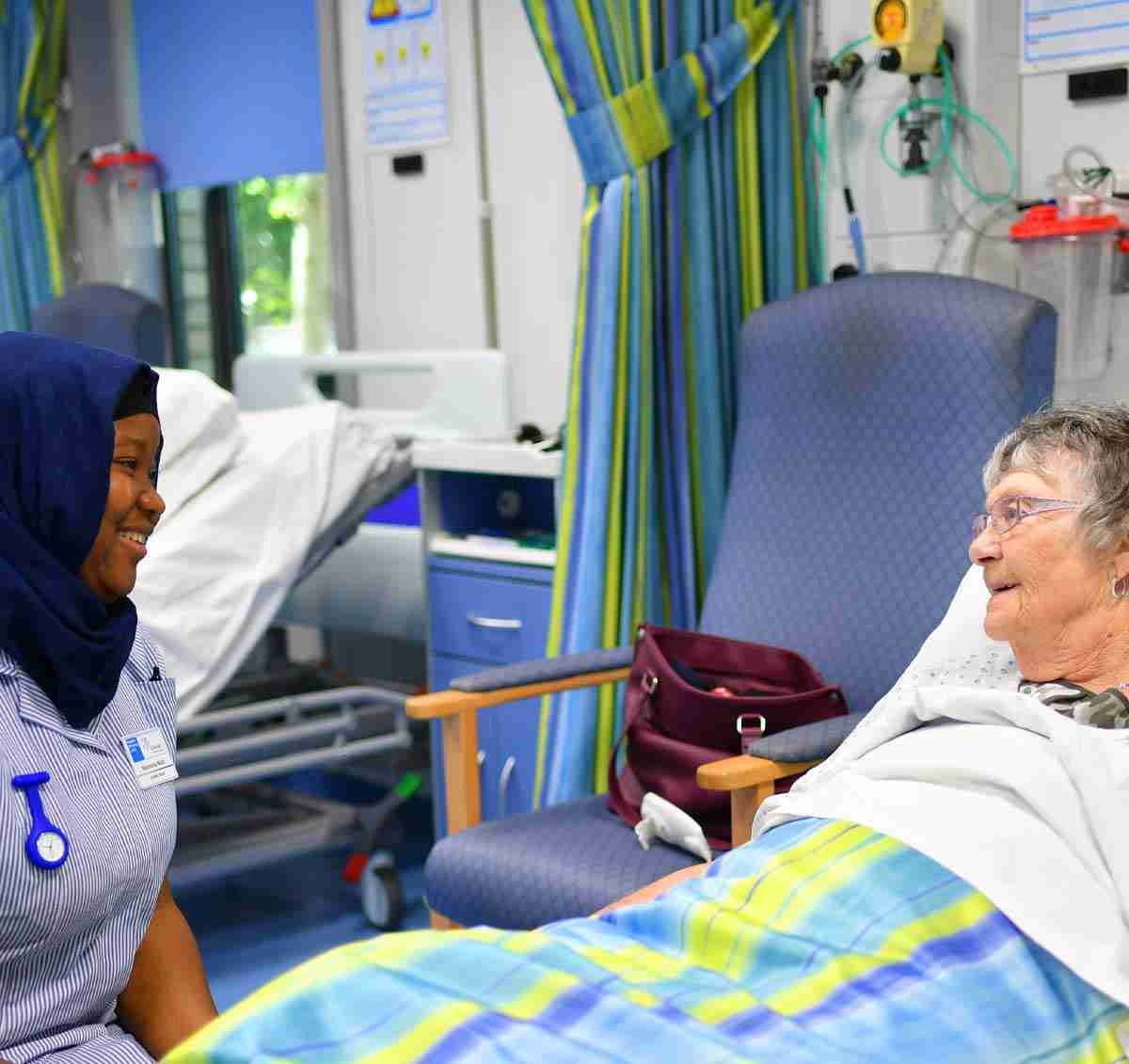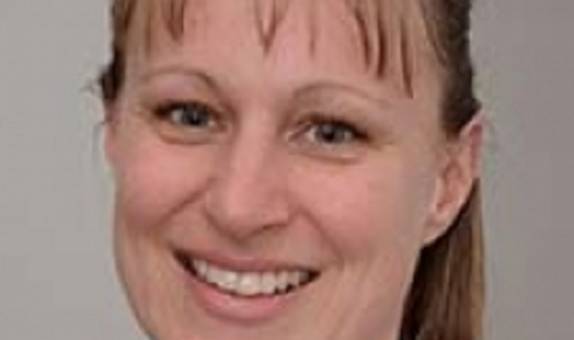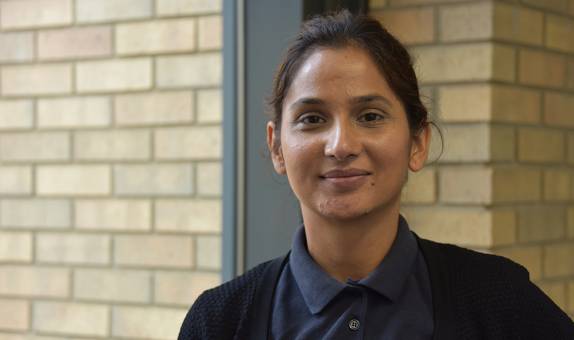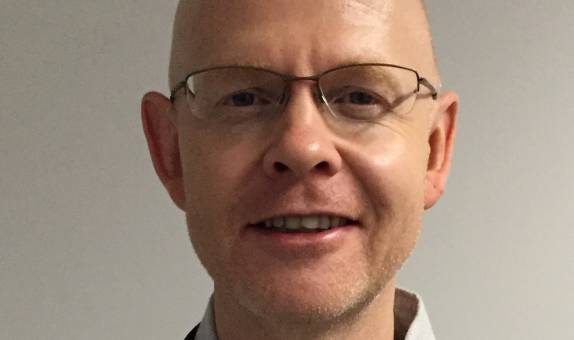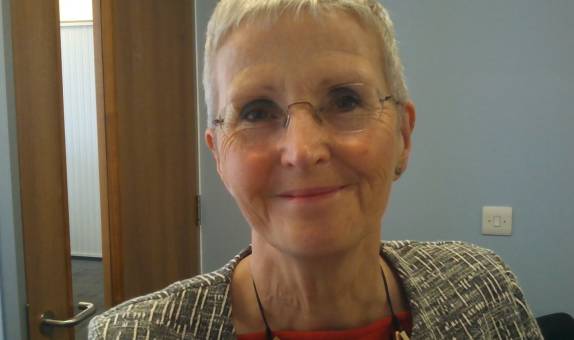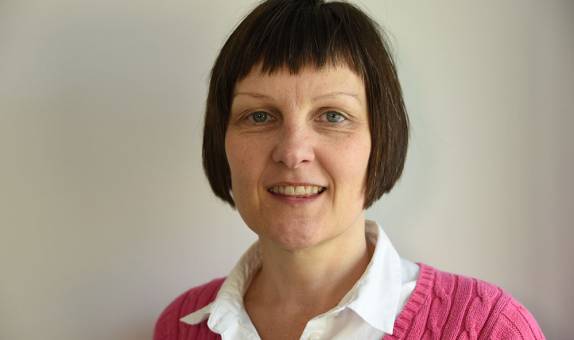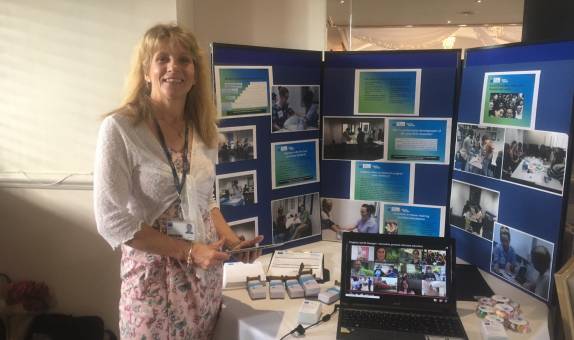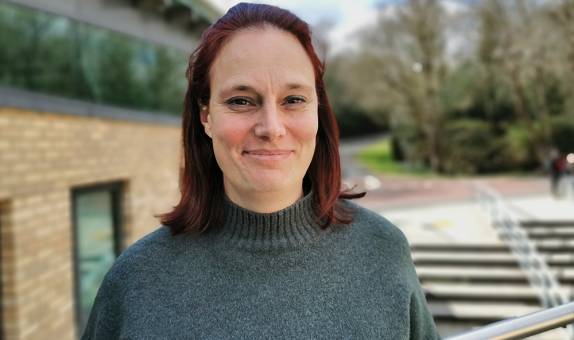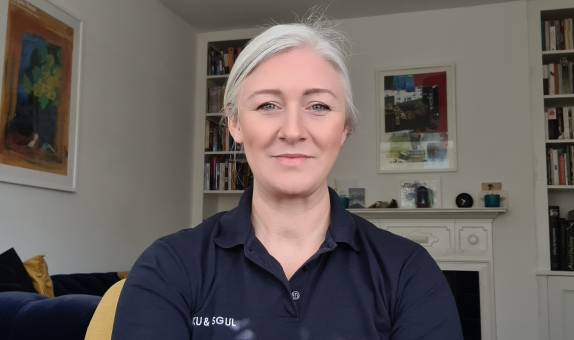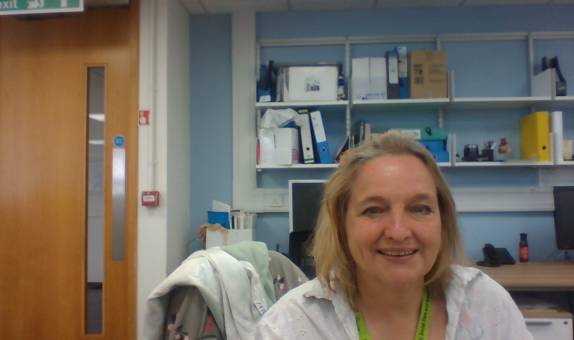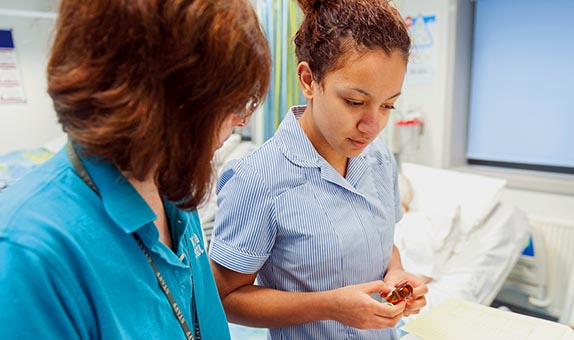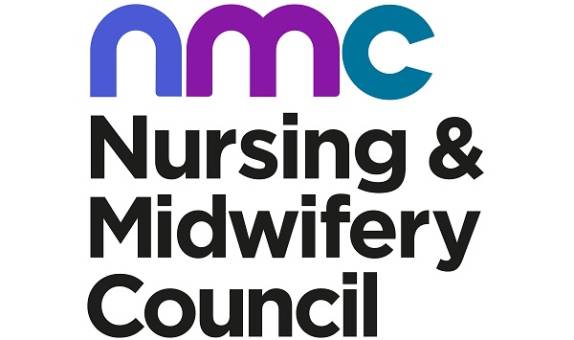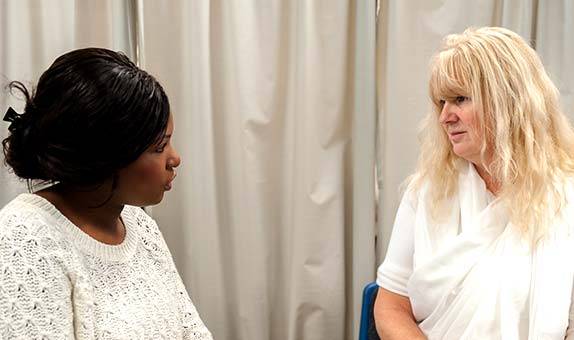Adult Nursing MSc
Why choose this course?
If you're looking to make a positive difference to people's lives, and already have an undergraduate degree and experience in health and social care, this masters course is for you.
You'll gain the specialist knowledge and clinical skills needed to become a registered adult nurse with the Nursing and Midwifery Council (NMC) in two years.
Our academic team members come from diverse backgrounds specific to adult nursing including cancer care, dementia care, ICU, A&E, neuro, acute medicine, community (district nursing, health visiting), sexual health and respiratory nursing.
Our simulation suites provide you with unrivalled opportunities to develop your skills in caring for adults through high-fidelity patient simulators and role play with actors. You will have intraprofessional learning with child, mental health and learning disabilities to enhance your skills in caring for clients from these fields. You will also have interprofessional learning opportunities with midwifery and pharmacy students.
Many members of our adult nursing teaching team have contributed to the latest Essentials of Nursing Practice textbook.
You will have the opportunity to take a national or international elective placement at the end of your first year.
NHS Training Grant
Nursing students on pre-registration courses from September 2020 will receive a payment of at least £5,000 a year which they will not need to pay back, subject to eligibility criteria. For more information please visit the NHS Business Service Authority.
| UCAS code | Mode | Duration | Attendance | Start date |
|---|---|---|---|---|
| B743 | Full time | 2 years | Classroom based and clinical placements | September 2025 |
Please note: Teaching on this course may take place on more than one KU campus.
| Main Location | Kingston Hill |
Reasons to choose Kingston University
- This course offers both an MSc and a professional nursing qualification. Upon graduation, you will be recommended to the NMC for professional registration.
- Develop and refine your communication and clinical skills through high-fidelity patient simulators and scenario-based simulation.
- At the 2023 Student Nursing Times Awards, we won Teaching Innovation of the Year for our public health elective placement.
What you will study
The first year is divided into two parts. In part one you will undertake a bridging module introducing you to the foundations of nursing and healthcare. In part two you will look at the context of nursing within a variety of client groups within your specific field of nursing.
In your second year (part three) you will learn about the analysis and application of research and evidence base and the complexities of nursing at an individual and organisational level as well as preparing for your transition to registered nurse.
Year 1 modules (parts one and two)
Year 2 modules (part three)
Year 1 introduces the foundations of nursing and healthcare, and their various client groups.
Core modules
Applied life sciences for nursing practice
15 credits
This module is a core requirement for all MSc Nursing students. The content of the module is designed to help you develop your knowledge and understanding of human anatomy and physiology in relation to nursing, which is an essential element of nursing proficiency. Pathophysiology will be introduced in relation to common conditions, and you will also begin to develop your knowledge of pharmacological concepts.
The main features of the module are to enable you to apply scientific principles to nursing care. It will also support you to identify and understand current nursing practices underpinned by scientific theory.
Essential skills for nursing practice
30 credits
This module provides you with the fundamental clinical knowledge and skills required for parts 1 and 2 of the programme. You will be prepared for your role in practice, enabling you to provide evidence based, person centred care to people at any stage of life who may have a range of physical, mental, cognitive or behavioural health conditions.
You will be prepared to make evidence-based decisions by collating and rationalising relevant evidence to ensure safe, high-quality person and family-centred care in digital healthcare environment. You will also be introduced to foundational pharmacological and medicines management knowledge to enable you to safely develop your skills and knowledge in the administration of medicines to clients, patients and service users. You will develop your understanding of the regulatory, legal, and ethical frameworks that influence medicines management and the underlying pharmacological science. Issues such as concordance will be explored, and the skills required to access resources to support medicines management practice.
Embedded within the module is simulated practice learning that will support the development of your clinical knowledge and skills. Personal tutor groups are integrated into this module as is time with your course director and year lead. This is a shared learning module with some key field specific elements.
Public Health
15 credits
This module will introduce you to the principles and practice of public health and the nurse's role within this. It will develop your knowledge, skills and attitudes to make a positive impact on the health of individuals, communities and populations.
You will be introduced to the central themes of public health practice and the NMC Future Nurse standards (2018) Platform 2. You will gain an understanding of the aims and principles of health promotion and protection and prevention of ill health. You will also develop a foundational awareness of the four core elements of public health nursing practice: Search for health needs, stimulation of awareness of health needs, influence on policy effecting health, facilitation of health enhancing activities.
You will be equipped with essential digital skills, including the use of public health intelligence to survey and assess a population's health and wellbeing. You will develop an understanding of how the social/wider determinants of health are important drivers of health inequalities. This module will also consider approaches to reducing these disparities.
You will gain an understanding of public health policy, and be supported to reflect on the ethical dimensions of public health practice. The module will also introduce you to the global dimensions of health, and its links with UK health outcomes. This includes the impact of climate change and the need for sustainable development and environmental management for the benefit of public health.
The fundamental elements of nursing practice
30 credits
This module will introduce you to the fundamental elements of nursing and person-centred care, compassionate communication, evidence-based practice and contemporary health policy. It will enable you to develop critical knowledge, skills and professional attributes for the delivery of safe and effective person-centred care of individuals and their families or carers across a variety of settings.
You will begin to establish a sense of their nursing field identity but also that of other fields in order to promote effective interdisciplinary and integrated care. The skills required for evidence-based healthcare will also be developed and digital healthcare as a concept introduced.
Adult nursing 1
30 credits
This module will enable you to build on the anatomy, physiology and pathophysiology knowledge acquired in the applied life sciences module to develop the knowledge and skills necessary to assess and deliver safe and effective care of the adult patient. It will equip you to recognise adults who are at risk of deteriorating, undertake timely structured assessments, interpret clinical data and use situational judgement to escalate findings, prioritise care needs and to plan, deliver and evaluate safe and effective evidence-based, person-centred care as part of the interdisciplinary team.
Practice assessment module part 1
Non-credit bearing credits
This module is the Practice Assessment Module which is designed to support you with the achievement of the NMC proficiencies and practice assessment requirements. The module focuses on practice preparation, reflection following practice experiences and the development of your numeracy skills. All elements need to be satisfactorily completed for you to complete part 1 and to be allowed to progress.
Year 2 examines the analysis and application of research and evidence, and the complexities of nursing at individual and organisational levels.
Core modules
Adult nursing 2
30 credits
This module will enable you to build on anatomy, physiology and pathophysiology knowledge acquired in the applied life sciences module to develop the knowledge and skills necessary to assess, plan, deliver and critically evaluate safe and effective care of the adult patient. This module develops your knowledge of the lived experience of adults from a holistic perspective including bio-psycho-social issues.
You will critically evaluate the political agenda and the socio-economic issues impacting on the health and wellbeing of the adult. It will incorporate professional accountability, social inclusion, partnership and interdisciplinary working, patient involvement in the provision of care promoting self-management and shared decision making.
Complex care for adult nursing
30 credits
This module will provide you with the underpinning knowledge and skills required for your role in coordinating and managing the complex care needs of people in partnership with their families and carers across a range of organisations and settings. You will develop knowledge and skills related to caring for people with complex healthcare needs including clinical skills. You will critically reflect on how the wishes of people, their families and carers can be incorporated into complex care planning and decision making.
The organisation of complex care and the political landscape in which it is delivered will be critically reflected on and evaluated. You will also develop the clinical skills and proficiencies required for Part 3 of your programme through skills and simulated practice learning activities. You will build on your knowledge of partnership and collaborative working and critically examine and appraise the cultural, political, psychosocial and technological influences on nursing care, resource management and finances.
Practice assessment module part 2
Non-credit bearing credits
This module is the Practice Assessment Module which is designed to support you with the achievement of the NMC proficiencies and practice assessment requirements. The module focuses on practice preparation, reflection following practice experiences and the development of your numeracy skills. All elements need to be satisfactorily completed for you to complete and to be allowed to progress.
Becoming a registrant
60 credits
Navigating the transition from student to a registrant who understands the professional and political environment in which they will be working is critically important to the delivery of safe, effective, and high-quality health care. This module aims to explore the key areas that will enable you to transition and fulfil the role of a registered nurse and also to prepare you for your role as a practice supervisor. The module is designed to prepare you for professional nursing practice by further developing your knowledge and skills to enable you to be an accountable and compassionate registrant within the health and social care system. There is a focus on the mechanisms that underpin care organisation and delivery, how nurses are integral to and can influence this and aims to develop your critical understanding of the factors influencing the environment in which you will be working.
The module will also develop your collaborative learning and teaching knowledge and skills enabling you to work with peers, people and families/carers. You will integrate your knowledge of learning theories, communication and relational skills to enable you to work collaboratively with others, critically reflecting on the challenges this can pose. You will also develop the clinical skills and proficiencies required for Part 3 of your programme through skills and simulated practice learning activities. You will have the opportunity to critically discuss inter and intra professional working alongside developing strategies for managing challenging communication. Personal tutor groups are integrated into this module as is time with your course director and year lead. This is a shared module that all students will undertake together providing opportunities for intra-professional discussion and learning.
Leading care for adult nursing
30 credits
From the point of first registration, newly qualified registrants are expected to be models of integrity and leadership for others to aspire to (NMC, 2023). With that fundamental principle as its focus, this module provides you with the theoretical knowledge and skills needed to work safely and effectively within healthcare teams and to critically reflect on this. The module also covers the more practical skills required to be a modern leader in healthcare including business planning, local workforce planning, and understanding human factors, all within the context set by the obligations and boundaries of relevant legislation and regulation.
Through participation in this module, you will become equipped with an understanding of what is needed to be a leader such that you ensure the delivery of safe, effective and high-quality nursing care. Theories of leadership and group dynamics will be applied to contemporary nursing practice while you will also critically examine and evaluate how we know whether your nursing care is safe and effective and what you can do to measure, influence and improve the care that we provide.
While the focus of this module is primarily adult nursing, some learning will be shared across all four fields of nursing through intra-professional learning activities.
Practice assessment module part 3
Non-credit bearing credits
This module is the Practice Assessment Module which is designed to support you with the achievement of the NMC proficiencies and practice assessment requirements. The module focuses on practice preparation, reflection following practice experiences and the development of your numeracy skills. All elements need to be satisfactorily completed for you to complete this level and to be allowed to progress to registration.
Entry requirements
Teaching and assessment
Scheduled learning and teaching on this course includes timetabled activities including lectures, seminars and small group tutorials.
It may also include placements, project work, practical sessions, workshops, conferences and field trips.
Who teaches this course?
Our academic team of highly skilled nurses, lecturers and researchers are known for innovation in teaching and learning. Our award winning simulation suites provide you with unrivalled opportunities to develop your skills in caring for patients, service users and children through highly realistic simulations and role play. You will also have opportunities to learn with and from other health and social care students.
Course fees and funding
Additional costs
Depending on the programme of study, there may be extra costs that are not covered by tuition fees which students will need to consider when planning their studies. Tuition fees cover the cost of your teaching, assessment and operating University facilities such as the library, access to shared IT equipment and other support services. Accommodation and living costs are not included in our fees.
Where a course has additional expenses, we make every effort to highlight them. These may include optional field trips, materials (e.g. art, design, engineering), security checks such as DBS, uniforms, specialist clothing or professional memberships.
Facilities
Kingston University's Kingston Hill campus offers you modern facilities and include well-equipped laboratories where you can practise within a safe environment.
Our nursing students are taught by the Simulated Learning and Clinical Skills team within clinical, community and practice health settings.
Our Nursing Simulated Learning and Clinical Skills Centre facilities include a simulated ward area with a medication room, clinical classrooms, one of which has an immersion suite for fully immersive simulated learning scenarios in different settings. The areas are set up with an audio-visual system so skills and simulations can be recorded for group debrief and self-assessment.
Within our facilities, students take part in award-winning innovative simulations with role players and full body manikins that provide unprecedented opportunities to acquire, develop and maintain the knowledge, skills, values and behaviours needed for safe and effective patient care.
After you graduate
- This course is ideal for careers in frontline and specialist nursing as well as leadership opportunities.
- The course enables you to join as a registered nurse with the Nursing and Midwifery Council.
- You will be able to progress into a variety of nursing careers, from acute to community settings within the NHS or independent sector. This could include settings such as hospitals, GPS, district nursing, prisons, private hospitals, charities, armed forces.
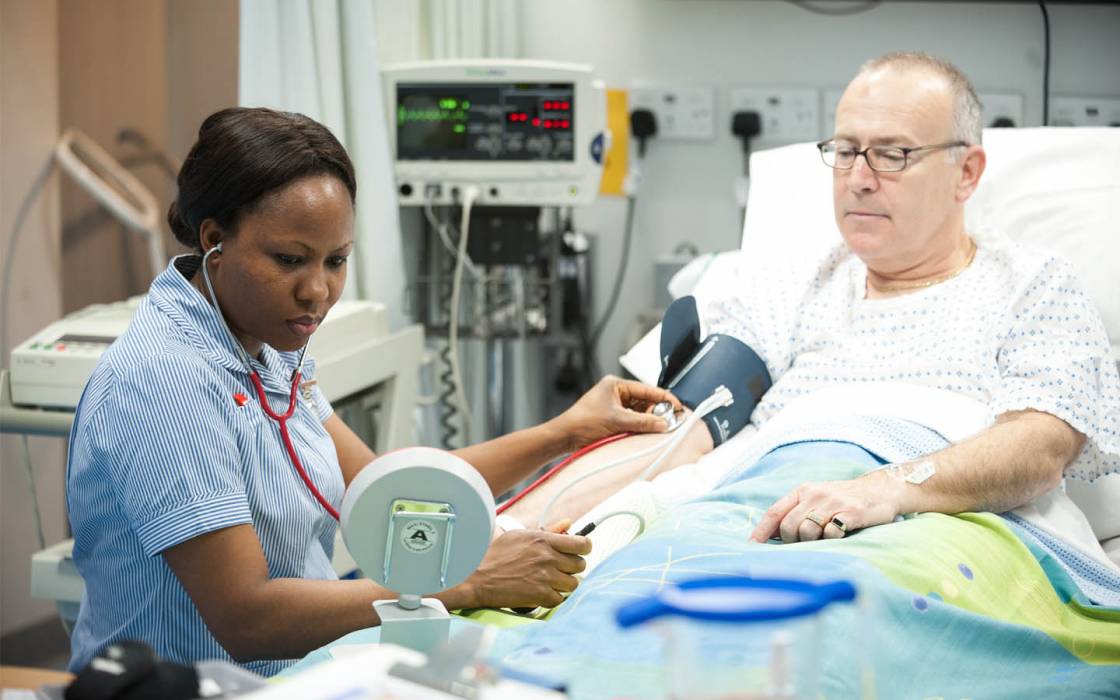
Accreditation
This degree confers both an academic award and a professional qualification in nursing. On successful completion of the programme, you will be recommended to the Nursing and Midwifery Council for professional registration.
Links with the health sector
Our clinical partners include:
- Ashtead Hospital
- Epsom Hospital
- Croydon Health Services NHS Trust
- Frimley Health NHS Foundation Trust
- HM Prison Wandsworth
- Hounslow and Richmond Community Healthcare Trust
- Kingston Hospital NHS Foundation Trust
- Parkside Hospital, Wimbledon
- Princess Alice Hospice
- Royal Hospital for Neuro-disability
- Royal Marsden, Chelsea & Sutton, specialist cancer hospital
- Royal Star & Garter Home, care home for disabled ex-service men and women
- Shirley Oaks Hospital
- South West London Elective Orthopaedic Centre (The EOC)
- St Anthony's Hospital
- St George's University Hospitals NHS Foundation Trust
- St Helier Hospital
- Surrey & Border Partnership NHS Trust
- The New Victoria Hospital
- Trinity Hospice
- Your Healthcare
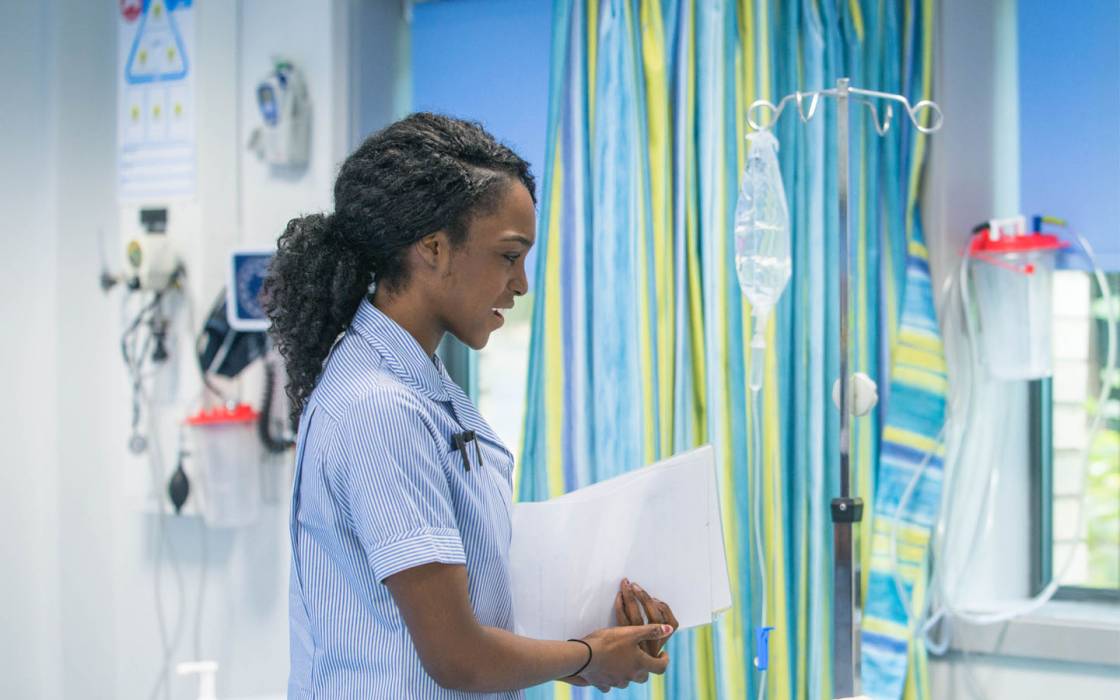
Current research in this subject
Many of our staff are research active, often in partnership with NHS trusts. This ensures they are in touch with the latest thinking and bring best practice to your studies.
Research themes and programmes include:
- Integrated and collaborative working and learning;
- Implementation and Improvement;
- Emergency, cardiovascular and critical care;
- Psychological and Cognitive Conditions;
- Education
Course changes and regulations
The information on this page reflects the currently intended course structure and module details. To improve your student experience and the quality of your degree, we may review and change the material information of this course. Course changes explained.
Programme Specifications for the course are published ahead of each academic year.
Regulations governing this course can be found on our website.
